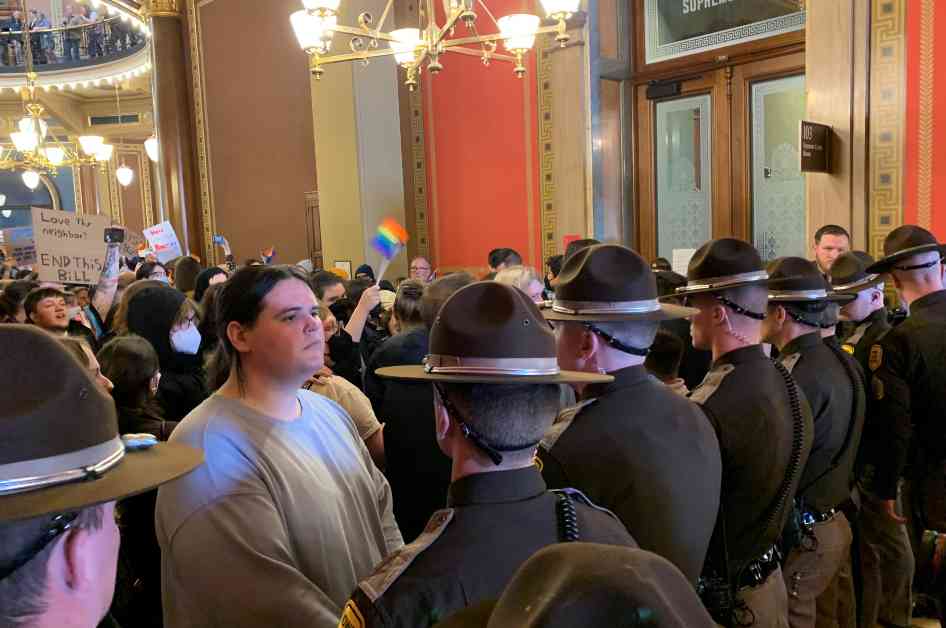In a significant turn of events, the Iowa Civil Rights Act faces a potential amendment that would remove “gender identity” from its protections. The bill successfully passed the House Judiciary Committee with a narrow 13-8 vote, showcasing a clear divide along party lines. The contentious nature of this legislation was underscored by a heated hour-long subcommittee hearing earlier in the day.
Amber Williams, a passionate lobbyist representing Inspire Life, an anti-abortion group from Aplington, took the stand to voice her concerns about the bill. She emphasized the importance of safeguarding the safety and privacy of women, arguing that the erasure of “gender identity” could jeopardize women’s rights. “Women’s spaces must remain sanctuaries, free from controversy,” Williams asserted, urging lawmakers to consider the implications of altering the existing protections.
Paden Sheuman, another vocal opponent of the bill, delivered a poignant testimonial that resonated with many in the room. He shared his personal experiences of discrimination, highlighting the dehumanizing and disheartening effects of being marginalized for one’s identity. Sheuman painted a vivid picture of the emotional toll that discriminatory practices can take on individuals, urging legislators to reconsider the potential ramifications of the proposed changes.
Chris Morse, a vocal advocate against the bill, found himself at odds with the time constraints of the hearing as he passionately recited a Bible passage in protest. His fervent belief in the importance of upholding protections for gender minorities was palpable, as he argued that any attempt to strip away these rights would constitute a violation of civil liberties. Morse’s unwavering commitment to defending the rights of marginalized communities added a layer of intensity to the proceedings, underscoring the deeply personal stakes involved.
Brad Lawson, a resident of Pleasant Hill, implored lawmakers to take a stand based on scientific facts rather than subjective interpretations of gender identity. He emphasized the distinction between biological sex and gender identity, urging a return to fundamental principles rooted in empirical evidence. Lawson’s impassioned plea for a commitment to objective truths injected a sense of urgency into the debate, challenging legislators to uphold the legacy of civil rights activism.
As the hearing unfolded, Tamara Scott, the state director for Concerned Women of America, urged legislators to reconsider the inclusion of “sexual orientation” in state law. Her call for a focus on justice and equality for all underscored the complex nature of the issues at hand, emphasizing the need for a balanced approach that respects the diverse perspectives within the community. Scott’s plea for fairness and impartiality added a nuanced dimension to the ongoing debate, highlighting the multifaceted considerations at play.
Diane Crookham-Johnson, an attorney from Oskaloosa with firsthand experience in assisting individuals with legal gender identity affirmations, shared a compelling narrative about the tangible impact of the bill on real people in Iowa. Her personal anecdotes served as a poignant reminder of the human stories behind legislative decisions, urging lawmakers to consider the practical implications of their actions on constituents across the state. Crookham-Johnson’s vivid accounts brought a humanizing touch to the policy discussions, grounding the debate in the lived experiences of those directly affected.
Outside the hearing room, tensions ran high as protesters voiced their dissent through chants and stomping, prompting a temporary pause in the proceedings. The visible display of opposition underscored the deep-seated emotions surrounding the bill, highlighting the profound implications it holds for various segments of the population. The arrest of two protesters further underscored the intensity of the clashes, signaling a broader societal divide that transcended the confines of the legislative chamber.
As the debate rages on, the fate of the Iowa Civil Rights Act hangs in the balance, with competing narratives and impassioned pleas shaping the discourse. The outcome of this contentious issue will not only impact the legal landscape in Iowa but also reflect larger societal values and beliefs. The voices of advocates and opponents alike continue to echo through the halls of power, underscoring the complex interplay of rights, identities, and justice in the ongoing legislative saga.





















